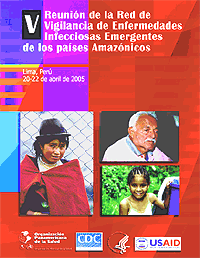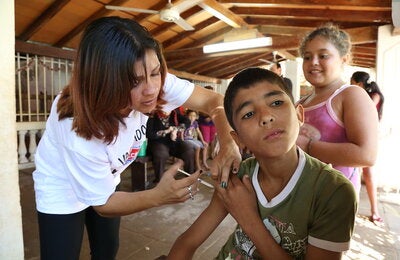Meeting sponsored by PAHO and three US government agencies:
Centers for Disease Control and Prevention (CDC),
Department of Health and Human Services (HHS), and
Agency for International Development (USAID)
 (Lima, Peru, 20—22 April 2005) This event was attended by representatives from the Amazon countries (with the exception of Bolivia, Colombia, and Guyana), together with special invitees (NAMRCD/Lima, Amazon Cooperation Treaty, and USAID).
(Lima, Peru, 20—22 April 2005) This event was attended by representatives from the Amazon countries (with the exception of Bolivia, Colombia, and Guyana), together with special invitees (NAMRCD/Lima, Amazon Cooperation Treaty, and USAID).
As in the Southern Cone annual meeting (Doc. OPS/DPC/CD/351/05), the official delegations of each country included for the first time clinicians as well as laboratory professionals and epidemiologists. Several matters were discussed, among them the International Health Regulations, the threat of an influenza pandemic, malaria, dengue, antimicrobial resistance with quality assurance, performance evaluation in serodiagnosis of infectious diseases; and the situation of emerging and reemerging diseases in the countries.
Dr. Cesar Naquira, Director General of the Institutes of Health, Ministry of Health, Lima, Peru, was elected Chairman.
Since the joint meeting of the Amazon and Southern Cone networks held in Atlanta in March 2002, it was decided that recommendations issued in the annual meeting one year would be analyzed to determine their fulfillment during the following annual meeting. Therefore, below is a summary of compliance made by countries with regard to recommendations made in the Atlanta meeting held in 2004 Doc OPS/DPC/CD/319/04.
Compliance with the recommendations to the Amazon Countries at the IIIrd Joint Meeting of the Regional EID Surveillance Networks, Atlanta, February 2004.
Recommendation Compliance
1. General Activities of the Network
To Countries
-
Recommendation: Countries should play a more proactive role in integrating EID network activities with the lines of action of the Amazon Cooperation Treaty (ACT). Until the communication channels and action of the Amazon Cooperation Treaty are formalized, it is suggested that Peru assume responsibility for coordination and follow-up of the recommendations made at this meeting and the next, contacting the countries through the focal points designated by the Ministries to review the document for the new International Health Regulations.
Compliance: The ACT seeks to contribute to regional integration and to a reduction in morbidity and mortality through improvements in the quality of the health services offered to the population, as well as by developing an early warning system and timely treatment. Because of several epidemiologic emergencies it was difficult for Peru to make follow up recommendations. On the other hand, all countries reviewed the documents for the new International Health Regulations. -
Recommendation: They should select a set of data and information to be shared by the countries, as MERCOSUR has done, and continue promoting multinational border activities. At the next meeting they should report on the activities carried out and their results.
Compliance: Although ACT intends to form an Amazon Coordinating Committee with health, education, environment, and other commissions; define structures, standards, procedures, and instruments; standardize forms; set up mechanisms for cooperation and information exchange to deal with outbreaks; as well as rapid response teams, none of this has actually happened, except for collaboration in malaria activities in border areas.
To PAHO
-
Recommendation: Facilitate the ListServ as a communication tool for the Amazon Region, registering all members to create forums for discussion and the timely dissemination of information.
Information on EID events of interest continued to be disseminated through the ListServ and the PAHO website. Relevant publications are also distributed through the PAHO/WHO Representative Offices. -
Compliance: Continue sending information on outbreaks and events of international interest and periodically update the ListServ directory so countries can use it as a communication tool.
2. Syndromic Approach
To Countries
-
Recommendation: Adopt the syndromic approach to surveillance in countries with indigenous populations to heighten sensitivity in detection and speed up case management, such as STD and febrile icteric syndrome. Select sentinel sites on the basis of risk assessments and optimize posts so that diseases with similar risk factors or transmission routes can be monitored simultaneously.
Compliance: The syndromic approach to surveillance is employed to some extent in all the Amazon countries. The results of its use were published in the Rev. Patol Trop. 34 (Sup1.): Jan—Jul, 2005, as well as in the report of the IIIrd Joint Meeting of the Regional EID Surveillance Networks, OPS/DPC/CD/319/04. -
Recommendation: Jointly review and prepare manuals and guidelines for syndromic surveillance in the subregión, and continue improving surveillance of leptospirosis, FBD, deaths from unknown causes, dengue, and yellow fever.
Compliance: While surveillance of leptospirosis and FBD has improved, there is no evidence that countries have conducted a joint review of the manuals and guidelines for syndromic surveillance.
To PAHO/WHO
-
Recommendation: Provide a platform for information exchange to reach a consensus on protocols in the subregión.
Compliance:There were no formal activities in this regard.
3. Evaluation of Laboratory Performance
To Countries
-
Recommendation: Participate in the performance evaluation conducted by CENETROP for serodiagnosis of EID. In addition, begin or continue conducting national evaluations to establish how quality assurance is carried out in public health laboratories.
Compliance: Ten countries participated in the III annual evaluation of performance in the serodiagnosis of EID conducted by CENETROP, Bolivia, identifying a panel of serum samples with an unknown diagnosis, accompanied by a brief clinical history. However, there is no evidence that this activity was replicated in national laboratories of each country.
To CDC and PAHO/WHO
-
Recommendation: Make the necessary arrangements for resuming the performance evaluation in the serodiagnosis of infectious diseases and present a report on the results at the next meeting.
Compliance: The performance evaluation was reinitiated in 2004, but the results were analyzed in 2005. A report on the results obtained from the third panel was presented at this meeting of the Amazon countries.
4. Influenza
To Countries
-
Recommendation: Continue preparing and implementing the contingency plans for an eventual pandemic and at the next meeting, describe the progress made in Brazil and some other country.
Compliance: With the partial exception of Brazil and, to a lesser extent, Colombia and Venezuela, the rest of the countries should continue improving their national plans for an influenza pandemic. -
Recommendation: Set support to expand the epidemiológical surveillance network (including virological surveillance), and have the national influenza reference centers report their findings regularly to FLUNET.
Compliance: The Spanish-speaking countries are expanding their sentinel surveillance network and attempting to increase the information periodically sent to FLUNET.
5. Antimicrobial Resistance
To countries
In 2005, they must report on
-
Recommendation:The results of the surveillance of antimicrobial resistance in community and hospital isolates collected in 2004.
Compliance: Brazil, Colombia, Ecuador, Peru, and Venezuela annually report the surveillance results for community and hospital species. -
Recommendation: Detail the operations of the quality assurance system, including the performance evaluation in the area of antimicrobial resistance surveillance.
Compliance: 14 countries have this information and disseminate it. -
Recommendation: Network countries should produce and disseminate information, mainly from hospitals, and on local resistance patterns.
Compliance:There is still a need to improve local dissemination of information in hospitals on the prevalence of the species isolated and the resistance profiles of bacteria responsible for hospital infections in the services at greater risk. -
Recommendation: Begin EIC (Education, Information, and Communication) for the general public on the rational use of antibiotics, getting both health workers and the community involved.
Compliance: Activities were launched in Brazil, Bolivia, Chile, Colombia, Ecuador, and Peru.
6. RAVREDA (Amazon Surveillance Network on Resistance to Antimalarials)
To countries
-
Recommendation: Discuss the conclusions and recommendations of this network at the next meeting of RAVREDA in Suriname on 17 March 2004. Distribute the report from this meeting to the countries of the EID network of the Amazon region.
Compliance: The report was distributed.
Recommendations of the Amazon Meeting, 2005
I. General Activities of the Network
To CDC and PAHO/WHO
-
Guarantee access to and the transfer of documents and information among the technical personnel.
-
To continue supporting network activities
To countries:
Tasks (in each country) prior to each future meeting of the network
-
Guarantee access to and the transfer of documents and information among the technical personnel of the participating countries of the network.
-
Update and disseminate background documents (reports, projects, guides, protocols, etc.).
-
Identify potential solutions for each problem detected in the countries that is hindering compliance with the agreements in each area.
-
Those countries with more expertise in specific areas should have the leadership to promote and support the progress of activities in those areas. For example: Brazil, ACT organization projects; Bolivia, performance evaluation of laboratory diagnosis; Ecuador, dengue; Peru, bartonellosis, and febrile illnesses in border areas; Suriname, dengue; and Venezuela, syndromic surveillance.
To PAHO/WHO
-
Develop instruments and methodologies to evaluate basic skills for the detection, diagnosis, and control of EIE, and prepare a matrix to determine compliance with the commitments of the annual meetings.
-
PAHO should send the reports from these network meetings to the Ministries of Health, as well as ACT organization, pursuant to the existing Framework Agreement between PAHO and ACT.
II. Cooperation between the Network and ACT Organization
To countries
-
Mechanisms for coordination between the Ministries of Health and Foreign Affairs should be strengthened. Personnel from the ministries of health must participate in the National Standing Commissions of ACT organization.
-
Identify reliable and permanent mechanisms for communication among network participants in the countries and ACT organization.
III. Syndromic Surveillance
To Countries
-
In the next 60 days. Brazil, Peru, and Venezuela will disseminate the current protocols to the network.
-
Share their experiences in the sentinel sites through the network's ListServ.
-
Development of joint projects, especially in border areas.
IV. Influenza
To countries
-
Countries must have a plan to be prepared for a potential pandemic. In the second semester of 2005, Brazil, Venezuela, and Peru will have their Plan that would have been disseminated to the other countries of the network. This plan would be the basis for an Amazon preparedness plan.
To PAHO/WHO
-
Through the Regional Advisor, PAHO should report on the feasibility of technical cooperation for drafting a Subregional Plan for the Amazon subregion.
-
PAHO should contact CAREC so that Suriname and Guyana can receive support for the preparation of their national contingency plans.
-
PAHO should formally consult Brazil on the likelihood of making faster progress in vaccine production and study potential mechanisms for supplying vaccines to other countries of the Americas.
V. RAVREDA
To PAHO/WHO
-
It is no longer necessary to continue addressing malaria and RAVREDA in the EIE annual meeting, although it is important to continue the exchange of information between the networks.
VI. Dengue
To PAHO/WHO
-
Dengue is a problem that should continue to be viewed as common to all the countries in the network. At upcoming meetings, an official responsible for its surveillance or control should be invited to discuss the situation in depth and try to identify assistance mechanisms that would improve the epidemiológical situation related to this disease.
VII. Performance Evaluation of Serological Diagnosis for EIDs
To countries
-
Adopt specific protocols and guidelines for information management.
-
Expand performance evaluation to include the public health laboratory networks in each country. There should be a protocol for these methodologies to ensure standardized evaluations in all the countries.
VIII. Surveillance of Antimicrobial Resistance
To Countries
-
They must monitor quality assurance activities of antimicrobial susceptibility testing to strengthen surveillance and patient care.
To PAHO/WHO
-
Disseminate the protocols, guidelines, and standards agreed upon, and continue the evaluation of the national networks.



